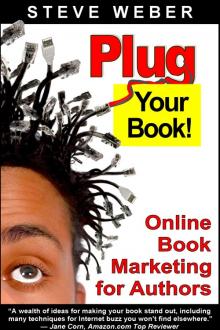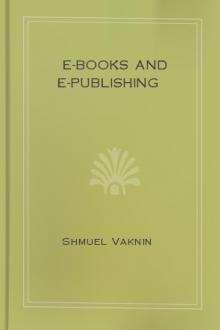Plug Your Book! by Steve Weber (books to read to be successful .txt) 📕

- Author: Steve Weber
- Performer: -
Book online «Plug Your Book! by Steve Weber (books to read to be successful .txt) 📕». Author Steve Weber
Amazon's subcategories are discrete enough that just a few sales can push your title near the top, exposing your book to more people who care about that topic. In our example subcategory #Home & Garden > ... Organic#, your book could claim one of the top three spots with only two or three sales per week on Amazon.
Once you've bubbled up to the top of your subcategory, you're firmly inside the positive feedback loop. Amazon acts as a huge funnel, sending thousands of readers to your book. That's why some authors encourage their Web site visitors to buy books on Amazon--each additional sale boosts their exposure, prompting yet more sales.
"Simply put, the more customers you send to Amazon who buy your book, the more visible it will be on Amazon, and the more books Amazon will sell for you," says Morris Rosenthal, publisher of Foner Books.
If your book continues selling for six months or so, Amazon can assign it to more categories, making it even more likely browsers will find you after browsing in related categories. Books that sell moderately well eventually can be assigned to 12 or more categories, the same exposure as your book being shelved in a dozen different sections of a brick-and-mortar bookstore. The big difference is, Amazon is the world's largest bookstore.
To see your book's subcategory assignments on Amazon, find the section on your book's detail page headed #Look for similar items by category#. Clicking on those links takes you to a list of the subcategory's bestsellers.
Sometimes persistent publishers can talk the folks at Amazon into assigning their books to additional categories, or removing the book from inappropriate categories. Research other books in your niche, and see which categories they're displayed in.
Narrow a list down to 10 categories and send your list, ISBN, and contact information to Amazon. You can send your message, along with any other typographical corrections for Amazon, by using this form:
www.Amazon.com/gp/help/ contact-us/ typographical-errors.html Recommendation effectivenessOnline recommendations are more effective with certain categories of books and price points, according to a 2006 study, _ The Dynamics of Viral Marketing_. Researchers at HP Labs and two universities reviewed millions of book purchases resulting from online recommendations.
Recommendations for medical texts tended to be most effective--nearly 5.7 percent of them resulted in a purchase, almost double the average rate. The researchers attributed this to the higher median price of medical books and technical books in general. A higher book price increased the chance that recommendations would be consulted and accepted.
Recommendations were moderately effective for certain religious categories: 4.3 percent for Christian living and theology, and 4.8 percent for Bibles. By contrast, books not connected with organized religions had lower recommendation effectiveness, including New Age (2.5 percent) and occult (2.2 percent).
Recommendations for fiction books were usually the least effective, with only about 2 percent resulting in purchases. Recommendations for nonfiction books dealing with personal and leisure pursuits were slightly more effective, resulting in purchases about 3 percent of the time.
Two book recommendation networks. The left shows how recommendations for a study guide were ineffective and ignored by consumers. On the right, recommendations for a graphic novel were effective, resulting in frequent purchases.
The book on the left is the study guide _First Aid for the USMLE Step 1. _The book on the right is _Oh My Goddess!: Mara Strikes Back. _ Recommendations for this graphic novel prompted bursts of connected sales represented visually by the linked patterns. The opportunities for networking are vast: Japanese comics have a wide following in the United States, are popular with children and adults, and are vigorously supported by online communities. By contrast, suggestions for study guides usually originate outside online communities, from an instructor or employer. Choice is restricted, online connections are sparse, and no word of mouth occurs. For a variety of reasons, readers are rarely passionate about textbooks.
Generally, though, fiction recommendations are least effective of any book category, resulting in purchases only 2 percent of the time, while recommendations for expensive medical books are most effective.
_Illustration from _ The Dynamics of Viral Marketing
_ by Leskovec, Adamic, Huberman._
Recommendations from family members or personal friends were much more effective for fiction and religious books than online recommendations, the researchers concluded.
Some book categories, such as gardening, have different recommendation effectiveness depending on how specialized the text and how widely the topic is supported by online communities. For example, books on vegetable or tomato growing had only average recommendation effectiveness compared with other nonfiction. However, recommendations of books on orchid cultivation, which tend to be more specialized, had double the recommendation acceptance.
Customers are more likely to buy a book if they receive the same recommendation twice. After that, customers tend to ignore the recommendation.
The study is available in its entirety here:
www.hpl.hp.com/research/ idl/papers/viral/viral.pdf Amazon Sales RankAs your sales on Amazon increase, you'll see a corresponding move in your title's Amazon Sales Rank.
Amazon's rankings show how each book is selling compared to every other title in the catalog of nearly 4 million. Updated hourly, the system assigns a unique rank to each book relative to each other title's sales--the top-selling book is ranked 1, and the slowest-selling book is ranked over 3,500,000.
The closer you get to 1, the more often your book appears in Amazon recommendations. For this reason, many entrepreneurial authors and publishers concentrate on driving as many sales as possible to Amazon during a book's launch. Enlarging your book's footprint on Amazon can pay dividends for years to come.
Your book's Amazon Sales Rank is public evidence of how successful your book is. Many booksellers, publishers, and agents pay close attention to Amazon ranks. So if you manage to pump up the sales rank of your book, it can prompt brick-and-mortar stores to order more copies. Publishers looking for a complementary title might ask you to write the book for them.
Amazon Bestseller CampaignsThe Internet has become an effective marketing tool for authors because it enables your audience members to find you, instead of you finding them. With online word of mouth, you gently reel your audience in, instead of blasting an advertisement to a crowd that isn't listening.
Let's face it, traditional advertising is dying, and it never worked with books anyway. More than ever, people are tuning out commercials, junk mail and spam.
There is no shortcut for getting word of mouth for your book. And as we'll see, not only are shortcuts ineffective, they can backfire.
One shortcut many new authors are trying these days is "Amazon Bestseller Campaigns." And who can blame them: What author doesn't want to have a No. 1 book and millions of loyal readers?
Amazon doesn't endorse these campaigns, but doesn't really discourage them either. Independent marketing consultants charge $2,700 for their Bestseller Campaign courses, and to a new author it might seem worth every penny. According to advertisements by these Bestseller consultants, one author racked up more than $35,000 in book sales during the first 48 hours of her campaign. Could it happen to you? You bet--you'll have a "guaranteed" bestseller within "38 days."
So go ahead, dream a little. Once your book tops the chart at Amazon, you'll be on the red carpet. Lunch with publishers. Bookstore tours. Agents calling. Movie deals, foreign rights sales. And next, you'll be on the real bestseller lists: New York Times, USA Today, and Wall Street Journal.
So what's wrong with all that? The bestseller consultants say they're simply applying good old-fashioned marketing to the digital age. But critics say these campaigns are just smoke and mirrors. These consultants don't discuss whether the book needs to be any good. Apparently anyone who coughs up $2,700 is guaranteed a bestseller.
Is it too good to be true? Are these programs worth it, or just a waste of time and money?
Let's boil it down to three essential questions:
Are Amazon Bestseller Campaigns profitable? Do they generate more income for the author or publisher than they cost?
Do these campaigns enhance the reputation of the author and the book?
Most importantly, does the bestseller promotion provide enduring word of mouth for the book, or do sales evaporate quickly?
Making the list#We're list-crazy these days. Everything is ranked: books, movies, radio and TV shows, Web sites, video games. The lists are dutifully reported in newspapers, magazines, and even mentioned on news broadcasts. Who's No. 1 today? Who's up and who's down? How many gazillion dollars did the latest Hollywood blockbuster rake in last weekend?
Actually, this stuff matters a lot: Most of your sales happen after you're on a list, because that's how lots of people discover you. For years, big publishers have used every trick in the book to break onto lists like the New York Times Best Sellers. One way is to offer huge discounts to certain retailers who place big orders, making demand appear strong.
For struggling authors, Amazon is the most democratic list because everyone gets on it, whether they sell tons of books or just a few. Each author who has sold at least one copy of his or her book on Amazon is ranked somewhere in
the 4-million-title catalog. The top dog has an Amazon Sales Rank of 1, and is racking up thousands of sales a day. The worst laggard is ranked 3,500,000-plus, selling perhaps one copy every few years.
Just for kicks, plenty of authors buy a copy or two of their book on Amazon, just to watch their Sales Rank spike a few thousand notches higher toward No. 1. But your Sales Rank slides right back down unless someone else buys another copy pretty soon.
Whether an author is No. 5 or No. 539,000, many simply can't resist checking their rank several times a day. And since Amazon's bestseller list is recalculated hourly based on the preceding hour's sales, the list changes 24 times a day. It's so dynamic, a short burst of sales can shoot a book toward the top. And that's what makes it fairly easy to create a bestseller on Amazon--or rig one, depending on your point of view.
True, Amazon is the world's biggest bookstore. But you'd need tons more sales to make the New York Times list, which is based on weekly sales from 4,000 bookstores and wholesalers serving another 60,000 retailers. With an Amazon Bestseller Campaign, however, you might simply line up 250 people to buy your book at 3 a.m. next Sunday, and you're No. 1. Sure, it's only for an hour, but you can put "bestselling author" on your resume for the rest of your life, right?
Well, let's get real. "Ranking high on Amazon certainly feels good, but it doesn't take many sales to achieve that," said Jacqueline Deval, publisher of Hearst Books and author of Publicize Your Book.
The problem is, Bestseller Campaigns are a seductive "quick fix" for authors who feel they don't have the time, energy, or know-how for real grass-roots marketing. It's frustrating to pour your heart and soul into a book for months or years, and then nobody buys it. Amazon Bestseller Campaigns can sound like a good solution, simply because they promise instant success.
How Bestseller Campaigns work#The core of an Amazon Bestseller Campaign is an e-mail advertisement blasted to thousands of people; some practitioners say it requires at least 300,000 messages to make any difference at all. People who get the e-mails are offered a one-time deal: a long list of "valuable free bonuses" like e-books, audio files of seminars, and other digital goodies, but only if they buy your book at Amazon on the day of your campaign.





Comments (0)